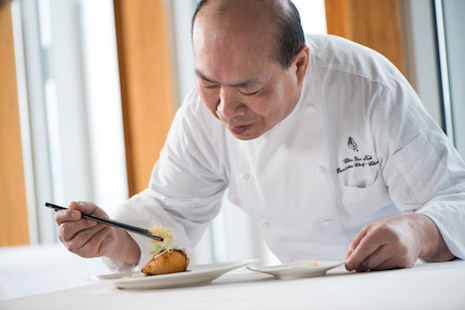As luxury hospitality groups continue to offer more gourmet and experiential dining options, many are neglecting to invest in room service because of the high costs.
During a webinar hosted by digital travel platform iSeatz, experts discussed how third-party delivery options are beginning to compete with hotels’ room service offerings. Many consumers, particularly business travelers, regularly order room service, offering hospitality brands an opportunity to learn more about frequent guests while enhancing the overall experience.
“Room service is not a profitable segment for hoteliers,” said Bryan Estep, chief revenue officer at iSeatz, New Orleans. “I don’t think it’s a surprise that millennials and Generation Z are the drivers of the [food delivery] trend.”
The webinar discussion was based on an online survey of 800 consumers conducted by Phocuswright.
In-room dining
As dining delivery has found wider acceptance, room service has declined in popularity.
Fifty-five percent of consumers between ages 18 and 24 have ordered food delivery, followed by 49 percent of those between 25 and 34.
Fewer hotels in the United States currently offer room service. From 2014 to 2016, there was a 40 percent drop in the number of hotels that had in-room dining available.

Palace Resorts’ experience tests aspects such as dining. Image credit: Palace Resorts
Two-thirds of travelers still use room service, but 62 percent have also used third-party food delivery platforms while traveling. The leading food delivery platforms include Grubhub, Door Dash and UberEats, and are accessible on desktops or smartphones as mobile applications.
With seven out of 10 travelers expressing strong interest in local cuisines, there is a perception that restaurant delivery offers more authentic food options than hotel dining.
Food delivery has been ordered by 11 percent of business travelers at luxury hotels and 29 percent of business guests at upscale hotels.
However, although less than 10 percent of business travelers have ordered room service at luxury hotels, nearly 40 percent have used room service at upscale hotels. In-room dining at those tiers is more popular among leisure travelers, with 11 percent ordering it at luxury hotels and 47 percent ordering in at upscale properties.
Guests order room service for a variety of reasons, including convenience, privacy and habit.
“Almost 50 percent of business travelers are regularly ordering room service,” said Jillian Kossman, director of marketing at iSeatz.
“People just don’t love to go to restaurants by themselves," she said. "For business travelers, this allows for an opportunity to eat without the awkward experience of getting a table for one.”
Hotels can add more localized food items on room service menus, such as beignets in New Orleans, to enhance the overall travel experience.

Four Seasons is known for its upscale dining options, such as Hong Kong’s Michelin-rated Lung King Heen restaurant. Image credit: Four Seasons
Hospitality groups Wyndham and IHG have partnered with Door Dash and Grubhub, respectively, to supplement their in-room dining options. Boutique hotels looking for more regional platforms can partner with companies such as Waitr.
Room service and delivery are also other ways for hotels to encourage guests to earn and redeem loyalty points. Research from iSeatz found that by offering guests easier ways to earn and redeem points, stay frequency and room spend both grow.
“Travelers are looking to earn and burn [loyalty points] in smaller increments,” Ms. Kossman said.
Guest data
Offering room service, particularly when coupled with loyalty points, is another way for hotels to learn more about frequent guests.
Although the luxury travel industry has been slower to innovate than other sectors, more hospitality brands are becoming increasingly comfortable using technology to enhance guests’ experiences.
During a panel discussion entitled “Innovating in Luxury Travel in 2019” at Bloomberg’s The Year Ahead in Luxury conference, hospitality executives discussed how consumer data is harnessed to personalize travel experiences. Information gleaned from social media, the booking process and more can help luxury hospitality brands deliver tailored stays or trips (see story).
Global hospitality group Marriott International is harnessing voice technology partnering to provide a more interactive guest experience at properties including St. Regis Hotels, as luxury travel offerings become more advanced.
Marriott International is also harnessing voice technology partnering to provide a more interactive guest experience at properties. Guests at select properties in Marriott Hotels, Westin Hotels & Resorts, St. Regis Hotels & Resorts, Aloft Hotels and Autograph Collection Hotels will be able to use Alexa’s voice technology to access services and amenities, including ordering room service.
The group will be also able to use analytics provided by Alexa for Hospitality to measure engagement, eventually adapting services based on guest feedback. (see story).
{"ct":"n8I29QHDJYofi9RbWtZlRrckPsgLKSRn2P2AbOmUCoHagUN39F7XDpD7y4dQGOQUklcmWIq29gUdSW\/1tk8PNzV8StjQFpFc\/fvBnIxB9nlQ8mDE9lHTjYyLY6s3UdQj1oMtr8oEe+lr9CAUiLHMpmzF66RpnQM3ob5Isb4YsaE7JHmngnn4hzu1eX\/g2ZURqfxs+0t2rHWxTuwnqQ9awHOxcx4ORXbd4Kr8zCXGAkUyKldmbOiJqatNQKaqe8jw3+8VMpc0ZHpBkynxiYQHLuRSx8bRluDl9eelJWE5RCPg4xMvwmwofUt6TVRtgWXfQsoKxqsfWPZhjgVhAdH7fbAEEgXLeUNDQFRwUswu6nuxb3m8GsKT\/5ZUsLVGovQ98Xtp8k5gocFbGh5Auont9gQ3\/EvlL8XSppO8KT3T5jXtyumeu+zqa3dpsIKmMr7IGWA9S5PTqURJgOpE7Fk7EliGrEC3yJIOEKvJr++r2MQYO6bevolD9aSPsM5Pn7uzcvylbDxcU4+c\/VB\/uObLI3Y8h8PgzFzpLV+LySn1w2qynRV2bDr1PJn8BIjY+1+bcooazmRHO4zfXASQa\/tDsBxpmw3v6hx2ZJDQppT6uz1UMOCbf+77C7FCJm9cptWTlWP6B6PWudakDnRlAortV3RM9gvSvZgGWgnXLXcyGr9cynp5Po8iz5sqdzTgPB1EDD31hjgw+Zt3d7hUx6GgefYwby8dHxZf3XS86fqezRdo81iYoTHK4Sc\/pWXWn4O1YvRxoM\/BchYGeosIJgX1W2ss7QXUec6\/dsuGKKBI35yBBKCx9CfwPjtYosZQvMFMosJrJ+AAhAsInrpgmmTgV6\/+Q+MH6wCS19OXvc3tBeq2ftd+a1QSapK+GRyI5qype4Dah8DY+ByVZguW10S\/SZWvBJN0GBk6aQydeJRYDLN6G8rKkZeA2aFHgjvdw3fZRXolJwSwTA0zIj4dzBrUe8zAQEGLzRozEuaX6j\/X\/V2t2MQPOI72uNPZRozF64o8AdOLlzF2nGY5rt+Rg9kOKLy4yi\/Lzzv8HTgEloasxr72yy6IOH\/UQ1buGDjGjaSrO4hdGe\/lu0WOjAgfv9aCj78VfGOrhUQ1\/0fkgwy4EjtEHrOivI3wFXZ7MFt8W4ZBYUsfJSOV8RPm4ow7psCXiCXZE8ksQXIgNgDSVmB5lbAw6bDInonZDQq9YGo6eBQrKHaUB\/QXNe6ejnwoHcB4ZxIuIJtXsI4TmNbi2xwMSK+9bMTCugEZ2cBt2Nbzg8sxXnuRkv37qcNOnawfcMNWuE1KxYOkwWTuCeVM2rbiS0fA8QkaqxB8dzq9ncnw3ELAZSyH1HZmxpqOP3yPm3XvlMmUXPnqBUbfd9dKY\/UO8L9J\/QaPCH9p9U6YiDJbnhxGYDFUADHtOGTRrDJVcWndJwQaY4rXlZPV6obVr1lGrRGHkAt2gzdK\/pWqQNTJrnV80e2Je+AiIrS0mhBaZllwC+tZpv5l0yDx6OZ46UXAgmyVOH2JmcAg7vZLHA84E7pbdfmsawLbrJT77EEvAET+jkTZR\/itJd93SfA+HShdvIhRJ5vY8rCJjWT7SKwaI+xRybI1uziHCtjWhCSNCCorGIxxnY5wlAyn+XnKkGUnJMCIhyEH9n4JRN9HBXDPyNPmCdjrG8PLXFEEe4VBBu4JmmGtKHPuGYEoBMozoeZHb+4z9Zqz4WQ9ZYPodNPJiiWXLJKxn8nde9cLoBjWxUdR702zwl8rKRI8cW5zL+5haeAU\/UZ4zLBg3+A5GUXMLAnK0MCyc4UUnajNLuojS4wUR7zaahoLqxyaEQ\/NQV0WzJaAUk3j5knjOOyir5KHMo0LTyLmVZsa7kCVeZvfwMrg2ZRd0vUhXd5roEGrGcNNe64wcGS8Z6Apl3a0\/EDsWn\/iSAhl4WSo5FJQ1ZmCNvm3WDAJahq\/qbE4ME0Clzoqrl42qv6CPqCpefTdf9DBjLFDqiDnDIcgMVf0yycf9\/KFIOkk3CSAfNnHtUrn5sA4FIsQyqQuYamwhy9qhYe1P8bhfIuuJ8PuV8LQSyTixqlN1aGnBd7pihct2kqW\/I0OpwQEAG0YIHGxSasvOp\/f9eYVSNJUj1Qg5eixOaRE\/q4WDqrLc6jB6RPlxbzUqF7N\/\/6qmrHKKgfE4JkJ6mEY+WMnc+FrfMth8Y7eECWx+fG7tDv5vEPP2H9Y6eP\/lLj9a2G0HppNNurS+i1RqrheihplFus7GvFRvqsGgzXcA0pymH3mFYTNokRIu4QO4HyO0K\/OURh128yaNjD2y7wnwoBp3N\/qU+FQLaB2JMKlvjwf76QBooTcQN8MlZZ9CzZXqZUxZFb9t\/Vh2tLncFnKhg8vKxt5ZbF7FiD+mGW08fGTGhA5sPUvsaCK6enOhEOJC23b4Q30pTvZFY2stvHVNbOy\/R9I8vPTPsj3co9NDGZgSSacIB0RwzZ9invUfDXT0nmierzmiVH5wCFNxfrnRQD+g8VCtemM9frQIkktCoKaah\/NZw5OgM12egTWwZ7FcUXeqlqMdUafSSHYPq9XNph7Ylz8MhkTsP28qbUJM8nJCsWt0s7FGkclYBpL0aLVWEvgT8aXxFo5XmFOBgKLmeu8dAiXLyKuGZBN74dNJJ0YUXsEJC\/bVcHPryAtJMzmpRPKCieIwT4JWuiLIB3KFDgZcmrFDAzjJ8jc2E5op0dZB+59YztETGjnnLje83qn3lkqjXvo8\/nLS3NFSEoaRSjwGPgefH60aR\/mE8N41YpTF\/9vKNJ4s74AfmsgVctPBbGH6Jzn7iRTmsGKsQhgsy4a5fE3x9hN90Pz\/tAzvVu3Pfzhx7Y6aypKEENETftz6pe34ze2tEscp+kGm2k0COWcWIZ+kGbg9qSaHWFGn+auuVpfUma\/gMUie\/o665DUrqA\/cQMxLVjZ69BNarjwKThxnG4\/ZCL\/NMMWYDTEotvg8mxNKYv2pUbQlxQKwDj+DiO0uOUOZJ2dKJubrGzA3kFL+8D8ZVPM9fPTzrf5a\/Q\/sOfFwVY9HiG9vpz\/kR1ze0xPVBjK7IDvBAU9\/7+gr5GKkKlFSKX9iHozq1e7XGQOKzr4vPL0racBvOXxtFMpzOlU2gR9IPUOGdPVDG1BtK3NNNzHy3YKMauRn8c0bTwh80fGHZ1Ru+oasIHijNw+58SLlfJK0moDA5AtczEhDx2n9gBN7ppslTuuh11HBFADIy4g00+dvXDX60Y4QOIdh6wJnAUACxEBUecfz07Oju15jnsYjGlm68oRWpolHn7kzHfEqVbVWnHyVjLPKLOPwmQo6eb+aI8rJJCRKqZ6eLbsH3UQ05kLmDY0b7HG+PeDQ6vOV3qAmvivCzNCLeOjItSeNZ6MU1Mg\/Jr9pwOAHFA7xep3ErKt0mDIti\/NVexM5Kec4Qt1CTQB8XolsKaL6NFi2AQMf4AIJSjRL0PQg6A2sIhJM5dcpdfxlRnTu8ppq\/LtbneBAHnUEDTMsZEWY\/EjOSF5\/kYCINKf3z7Uj33t1Tjupo535yqPbY2HHFRUXJtRiapqE4VoY3I3SyE56I7+LFeL7dzNhk2rFbcldHGCSkEux5GCFZ8vSLhH5Er6pJk8hPJkYBHROWnN\/jSigvGyztKf4U4l5kTLEVdOUj8z4IHOHKG2bQFs4wpP1dHVPJp5t6v379DyMLnXF3f7c4UFrK3BGvQ9zhznBVHNBT8GzIiFU\/7kX8hyj7Rjm6AZVn+3gCETjRZPmmpkO6gdaeMWDkZT6ye9AbXvZpIaoQYLwSHmCj\/tJlRCB0mz70\/d1Xd8VkzXyIqtkR3d3TDGAEyF3ymssSJQQ499VO5Nl46jnSKWj9ndWSQ9U4hV0j8QraPW2qLWpZAS87NhcTCZBvWummAFJD+c6Gc9T+mW2VB\/HCh54CbOBu8C4pOtgrLW+rZ33bdCNw+8OO16wAPVb+WeUwPOKDeM7EqJenjlxIBr9IZisdLGqrG391mVAYv8ZB+MvgItL83OmeLnquZiqet0vHfyg55yPlbB46fBbt3gjLs2M4ScrhLlbu9hFr1Lz0xeXvW1NKiTt2RfjoxMMrX462sHQOGMPZ8qS\/Un9D0s0DLq\/6NRK\/f7W2BqxQ68wytefw1PI2Pj9z2ND1CaBZ24kZtusQjhI8qYiEecj\/a8E1QRXxW1MSmUOX89lGPz5F1cVqji0T3SY72bb3TajC00lXWY966GRDdo+G7BtxmDw7cdhzuZlM0zRmiE+yyZtyW1GY+s0T0jtm3HvrXasA1rH3R54nM1dtLNMCZouybQRGsB6U\/56mJbukRowtsiOUNmxaenhWcKY2Rxd4wWc3AvI9HA+PBtWe2Fbw1U3ACV43iYfmH0VtFMt8GJonOS9DA\/EOg6y56u3HWFZMEbYYwM1x5CcHNo8VVKmnAzZTjfvQWuKBIyWLaQtYoNQATlMTNpfW7uNn17nirRXiTRAMbto45UNPBNRmjeWuM5EV83oqMgLhpoLs2uD7\/CXKvQe4c\/IelYXu9+MICt49DDFeicGHf8lR0wwLCCC+8iDBtFtLPVxEvQZgJKSk35qHGK88NQJkxBBaWuTZhBvoMcpgvj\/rFJOV9NQOoLk4gTV9JKUCn6u3FAdbpXOsAmYm\/cdZo0f1nRZ\/I+BleKyoCvqOBtTp77SADppjmgM\/0M\/L4jzIrci4iRWUyeuKhYvMHEbKsw5FLClyol1K7A8hDeX8qCWzWSfEnE2WC4o2yBUKEWQYsRCIgIHlBwXyROSZLNV8SvaTBH4rGM2\/itTNvSVYmUfmND91kieyFHcqJ0Ye\/dL2pk\/MwunLmdU3wCv18w8QpL0K0m8mGku\/mCb6TNRLl051w\/+ZpkVGMN0cPAJUddR3WQGv++ySmK97Q11hWMSpiJW02FmDRlefH29JAbGJJEFwDGyurgQRNN3Neux8ihM1njICVlF6ZILnq8B8YVZwd58BA97ea+n4RZULUMI\/td+c6\/NzNauF4DQHjRA9xLw+fYahVAmMBV4A+\/NSJpDtxVc+BCnUN2UfbyN2wCqlURBYagOvqfQb7oakIusqf\/rE\/9xwCxiK3FyTVaqc58VI9vUIoicMEsTp+Ag7i60tgxh4ecRojnkJCatugSMm\/o7+ktq4RsAhSKYRuM1s0LW68gCQq9g\/EhrzLMAAjYPjXF6IvNiRK4dIcsknMndqnjALpA5lRjGx54qs2E9YzGYOmcffrNquhSlacKDIeF5x5TyfMuo7IRs+edMHgIOl+NI8\/pL0ngjThiDkvnWfRblAW8WjCrepkVr2u4d7PYQXqddzpBH+\/xWEK93P6RL8Ffbh1UFMS4Qv8ckLDLlzMZvCaUjFsr6q0d\/Z6N3uZm3TrEiLdWVyTslm7GHw66moV8y635PnBWDGBgWbtmxY7PEnWoEDzoGztdprYUtPeyG8zckRtRrQWEUSaFJlIsp7hn9NOr8xeqm+cWE\/0DFjbeD1nQqqTF5sQiAv0RkmccDZWIfb\/WaErcshXfwRaSsR6FkrH6dpWH80AZe5rdcQYvEMBxiCUyGLjqukA15WDyagcOrrNp1GMM9pxeBAfBGm5YdjJr6nWbHQImZWEW2b8MHJphkObOG3Jb9O4kzJZVXaS2fy3+PltXJGQtEmAQ7VmyUSwrPF0qcgutJ+et1ES5WBmWY8T1uEvCZEGbQEqzH4km4JHspzDSHAcDzVkDvg9MtDC1ttVWz9plwVvNcmBVD7PFPZSvgZJNmKraD9a1deM378mipGx49frmF1ugg5UN5iWsTcrSc79RoHqQRbHUFUNFGQ3zxMqSzlpAHWlw18YjhWiWHC+fu9SKf3vZeSCx2YYCg2TLL8XI9+1NQnk19xurHzaVC1gzN\/7ZU9bPJLI7KoCy7T6ykazm\/mJYwJ+bMhFM5TWm09hD0yHoi2DYtOFCj\/YHuVu2cf\/D2PqNfiblRlByUYRrIWgoEbsr4HShemkHHvTgV4lqfosE7eL\/vDvZOXV4yI1wpyulXJfChO2hqPO7+YWmQifxdnJcXarkVMC759m9pFogSGqq9TtkHvsK21a0Ldd3k6HXcwSwQMMABMZzII+hfMt\/eeXFLIBL+9B9sKwU4Mty+Huudw+t\/hplpIdlY7WgwFlsmPV7pzxmDLohG3Kq7YpYjujM7D8zMs0HDw03xWqlY0SxTllFXcBS4kD4iYp\/NOe6fj7KQgoXcTAVmQMCoWh7N8ytijY+vsDXFR73pEiWC52JyH1UyDolvr9jjOJMSNocRaxHjC9z2STCijD6gCvKKNI8qBsZVeCDEdKThv6dIkSvaOzECk\/U3Wb37rTJq6MKfdH2bMI3vktSCMDDA\/zjYXM7WuZWkSXkiA+NPPsqY95enW+AIsTeAMED7yKSk\/94eda0EaMUWP8uew5yrc6NZtBhVBJ1EuqiDdfRpKiZFE9UbU9\/sQPcTVYe2Z1DVdzs34n8G+AvKQ06bgA6lEOH6YaJa0qoXBUFbXytW0IB0b0bBlwFDWe1StITwjsU3Q0yd62GvaC1sD0Yky3DzauO8EvV\/inALtTyJKh3LU6Aw1n13\/WhxkieojniG0AVpwKu\/VF1gJyQt5\/sFJEUfdAtljguTbV5kmfaQV7YtgzMZsS+zuOnaBfgmNhej06iHNZsqXu4rmWB4t6k50TrMAwkiKZ3OuwMdG\/FwnRYpONugI8qVVL73yPybf4lcUewP3LHeo2IzwtwBYqijLnu2ArqP3\/BN\/Z3qq4KGeRI+Q3+f7WAarsnJd+KqY\/GsdWbCZugQ6SAGhV5Zorwtiwo1TMaZ0xyoKb4a4SFTkKdBhMje7GAeh9NYbIkcMFPBKhRvL9q3Jo2NHSgCk34qgOgNjdqlbFJX75In\/I\/D8yn5a6vcC6vRGgWhDRwA709lxASPq0kV2MDNU79YblpM4vHXxzXNB2D+FIdIr9dJISl8WBnL6ln3fdHhDiBDmvf\/O8sGh7yO5nEk4NM9F34A1Bv7awYA2eeV6QdPhr2wP3bTBN20zkvfrAtgTMApUbPD3X8MjgLaD7poMRzhkzjkSxy2mSiKTzu6SuPC+koCGWI9yYL8z\/OADTWdy09CKLSlY8FOlG7DiXU0TIvxMSG7SRx7CtbBm96inx7+UFueJ033fdFfbLa4t2irPz3HJphF3Miqzmb3WlmD3QslGsrManZ5dh6jq0MxkSiHh8WciLmMaLvQ+wU0liSskHKTtBUBZWlg4G5BylzPqwb2DgEbKWq6KGYhf\/qGe9ArfWDwxaoEgIQBW6uucuojtXNg85SeWZu76xVYO3BtX\/8AbGXLXYjj0jwF3I730YgEzybto4DEL9oW6u0dgVehzKX3Y02APS0\/EZ1Lv2o5ZGClGGlbZI+yfcwAEQXq4EZY9X9z+RwVYuEViL3OZzvqiMvynrrhGr1loALB9ksoKftVPRFvpYFFIIz\/W2NQ1bk2IKHfzToDymhCrLUPJuT+sKbWiHRzlYlNm6p4fObaDH5RDsIVMSDmpAdP7xFdLfsk408wi4AlqJ+TFE\/JbrLH+TAFIogcKhXlzc3GwK4d2cpDsjii3ak81d0y9J2UgcOgbaWU0G+Js68xdMRKZfyakcvwR+NCH\/yk4HRwSwD5udeWv77temm0r67p2clfP7KOtQM3MtV97SfTXCb+WhVnhszrWm9vGNQsAzZrrxCp\/mfJuADeEoTKk7xmKvmd9owCPmp7EZvBy7hwDsK6h0qrHZL9cgvAYJRhoxIWs8kFTnYILQGJhaxUyPpojQonr0DoEq\/PdAobCGKLozQphY7eeKfc7\/k8AsFGarE+r9vvIYvBtn7axCBnu5GQ+6Jkzf+hYZsQJnWNUgexY1pW7WlCirFljvqpDINtdCoJw4UiXwH3i0MZe3Ul9CGgFpZb3YVeelWR8oZAbUaAMF3USFiDdbkpWmQpGcq7RserTTR6BSof1lVaHbyIpAoY2VThWkvmwd\/mY7N\/zEZDgmf58ete6CO0JqyewTExzRAfPCjc7oUCLfRyJL9zi\/ySCiPeWORn2iK64pRflWLkuf1\/QLp2d+Y5q958Vlu3Yl2LTF0QLIixDqbo1\/+UckdCSQWhbMDWj0cAKJth9ylxF1EQyfNrpPQhtaNNtvAxA+prNdmgVYRsRaqZcUc58yzsLRCLshdNOb827PE5Xt++8nzNaTw1PM2Z76nGhzjsTiwrskq0pHMqz1zL+yO0QoaUDdZJC3j2INZx06YTGVmKR29C+V0D52+RflP6bUqjLs2qTxqV9zV0JRYrog94XUxiuMaDy4YsVn5CRsi5RA9D3FLEHKPDFCnLxG\/C7LBtqaLceShbb2pr\/DESBw1RwiROT3BeazQea+qEWyusBIpgewk4SwsvQVDRseS3\/PK1lcHvnK53fhofG6m05THUjLJnNvsJa6BpS1Hd+DYnvb8SCsKI9yxz8wySpjO3CHwLRRYZUgfBZSTuh\/4X3pamu5NZvHETCzuagXzuOONdAArr32AN3dga5Hk+A3TOAA1WqRE9eG9wFpmlNjhY1REKRwxe1S8EeaY3tlDFZx\/Kg6wtfw7vZ7yTqEi0L7PlaHmIr2+9MpGi9aOj7c1+nMaR8DHVSn1SfcvcJtzuN+2OsfO5X83e4qLSTDbbETTEoTm7L04KQeVTYE\/kWKIQUZfQX+e\/+HGgtSmd5g\/rKRJ3FhEQqzEDjTkJTpm5PjNtDEhf4Slm75ef+FVclof0OxqiCr4XcXnwxhbseuKfJ1PCB8X75vauRNWWUUugUJdRcFCQgrnbBqtnzqhZNxKQcfOs4dppjqSWvVBR3Lpg7ekugGepqLcmE\/ZOaRHWJBZGYoBiHr+j6MpCCY=","iv":"d7d85a7ce8840d0b72ac5bb583657483","s":"aeb7e4755e475432"}

 Omni Hotels & Resorts' Culinary Kids program. Image credit: Omni
Omni Hotels & Resorts' Culinary Kids program. Image credit: Omni